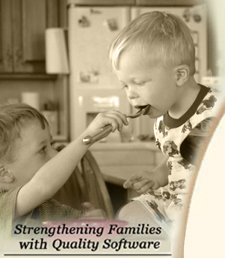
|
Part 3: Storage for Our Times
What To Have Ready at Your Finger-Tips
by Patty Liston
 New Orleans was not prepared for the devastation caused by Hurricane Katrina, nor was her inhabitants. Like most of us, the people in Louisiana and Mississippi, probably believed that calamities such as earthquakes, floods, tornados, hurricanes, etc, happen “out there” to “someone else”.
Because of the horrific consequences it caused, Katrina sounded an alarm in the hearts of many who watched and wondered how prepared THEY would have been in such a situation. What if something like that happened where I live? What would I do? How prepared would I be for _______ (fill in the blank with the natural disaster of your choice).
 Barbara Williams who works for DVO, had up-close-and-personal experiences working with the refugees that came to Camp Williams in Utah following the flooding. Because there was no place for the thousands of displaced people who were now without homes, food, water, work, family, or resources, many were put on transport plans and taken to various locations for safety and shelter. Camp Williams was one of those locations and Barbara was one of the dozens of volunteers who met the plane, and cared for the refugees. Here are some of the things she related to me regarding this difficult experience.
When there is a calamity, you will be in shock. Don’t believe for one minute that you will be able to remember a family member’s phone number, or even their names. You will be in “survival” mode. Barbara said that it was sometimes up to 3 days — and in some cases even longer — before the volunteers were able to get this information, and begin contacting frantic relatives.
 In any kind of natural disaster, chances are you will be separated from your family. In Louisiana children were at friend’s homes, husbands were at work, wives were shopping, and other family members were scattered as well. In any kind of natural disaster, chances are you will be separated from your family. In Louisiana children were at friend’s homes, husbands were at work, wives were shopping, and other family members were scattered as well.
People arrived wearing whatever they had on when the levees broke — and they had been in these same clothes for days. Many were bare-foot, with sores on their feet and legs from standing and swimming in contaminated water, and/or walking for help.
All of the women were on their periods. This is a natural phenomenon that occurs during catastrophic times.
 No one had any money, personal ID, or necessary medication. When doctors arrived at the camp, the refugees could not remember the names of their medications, or the dosages prescribed. Hospitals in Louisiana and Mississippi were swamped and understaffed, and a lot of doctor’s officers were under water — as were their patient records. No one had any money, personal ID, or necessary medication. When doctors arrived at the camp, the refugees could not remember the names of their medications, or the dosages prescribed. Hospitals in Louisiana and Mississippi were swamped and understaffed, and a lot of doctor’s officers were under water — as were their patient records.
Clean drinking water was worth its weight in gold. No one had any. (See last week’s article on the storage and necessity of water).
It was several days, and in some instances, weeks, before the displaced families could find out where other family members were, and if they were safe. The fear on the faces of the people was the most heartbreaking for the volunteers to watch.
All were hungry, thirsty, in need of clean clothes, baths, and slippers. Because of the swollen feet, shoes were uncomfortable.
I could go on, but you get the idea. No one, least of all the survivors, was prepared.
The following is a list of things that you can begin to collect, copy, and do, to prevent the situations listed above. While we cannot predict what may happen to us unexpectedly, we can prepare ourselves and our families to be ready, should the need arise. Most of these items can be found at out-door stores, department stores, and in your own home.

supply of water (one gallon per person per day)
first aid kit, prescription medications, heath insurance/Medicaid cards, doctor and hospital name and phone number
extra pair of glasses
credit cards and cash (The suggestion here is @ $100 in one dollar bills. Remember, ATM’s won’t be working, and no one will have change)
change of clothes, sturdy shoes and 2 pair of socks
battery powered radio, and extra batteries
blankets or sleeping bags, rain poncho, body warmer
list of emergency plan contact info. There should be one friend or relative, preferably someone who does not live in your same state, who will become your family’s “go-to” contact. Everyone should be taught to call this relative/friend, to let them know where they are, and that they are alright. In this way, even if you and your family are separated from one other, one phone call will give you an update on where everyone is, how they are doing, and go a long way in bringing you peace of mind.
booster cables for car, car shovel, rope, N95 dust mask, working gloves
flashlight with batteries
wind/waterproof matches, and candle
personal hygiene products (baby stuff, soap, tooth care, toilet paper, sanitary pads/tampons)
games, books, hard candy, toys. Even if you don’t have children, someone else will, and these items will be a huge comfort to other children and their parents.
tire repair kit and pump, duct tape, Swiss army knife
IMPORTANT PAPERS
The following should be put in either a binder, or 2 double zip-lock bags to keep water from destroying them. Some recommend putting this binder or gallon size baggie in a fire-proof, water-proof lock box for safety.
 birth certificates birth certificates
passports
social security cards
copies of your credit cards front and back
homeowners insurance policy
auto insurance policy
life insurance policy
bank statements
retirement statements
internet passwords (banking, personal, work etc)
immunization records
utility statements
work/tax documents that would be difficult to replace
CASH – keep a variety of small bills on hand (see above)
Extra copies of car and house keys.
Medical information: doctors names, prescriptions and their dosages, along with any other important medical history.
It was said that during Katrina, medical students went to hospitals and clinics to render aid. However, since they could not PROVE that they were med students, (no ID), they were turned away. These documents will help you PROVE who you are, and what you have.
Contribute to the Cook'n Club!
DVO would love to publish your article, prose, photography and art as well as your cooking, kitchen and nutrition tips, tricks and secrets. Visit the Newsletter Submission / Win Win for All section in our Forum for more information and details.
|
|



